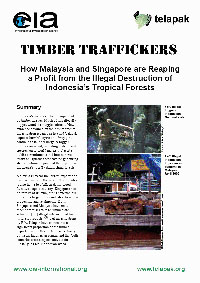How Malaysia and Singapore are Reaping a Profit from the Illegal Destruction of
Indonesia’s Tropical Forests

Malaysia is by far the largest exporter of tropical timber in the world. The country is also home to a billion dollar wood furniture export industry. Singapore has no forests of its own, but is nevertheless home to a large timber industry, based on processing and re-shipping.
Both Singapore and Malaysia have made recent promises to take “immediate action on [the] illegal international trade in forest products. But investigations by EIA/Telapak have shown that a significant proportion of the timber exports from both countries are actually of illegal Indonesian origin, and that both countries are acting as conduits for illegally logged Indonesian wood.
In an attempt to curb the rampant illegal logging destroying the country’s forests, in 2001 the Government of Indonesia (GOI) banned all cutting and export of ramin wood (Gonystylus spp.) and placed the species on Appendix III of the Convention for International Trade in Endangered Species (CITES), an international treaty to which 155 countries including Singapore and Malaysia are signatories. Ramin, which grows only in Indonesia and Malaysia, was being illegally logged in several Indonesian National Parks, including Tanjung Puting, one of the last strongholds of the endangered orangutan. The CITES listing meant that ramin could only be traded internationally with official government permits. The listing came into effect in August 2001. In a further attempt to halt exports of illegal timber, the GOI also implemented a total ban on the export of logs in November 2001.
View and download Timber Traffickers

